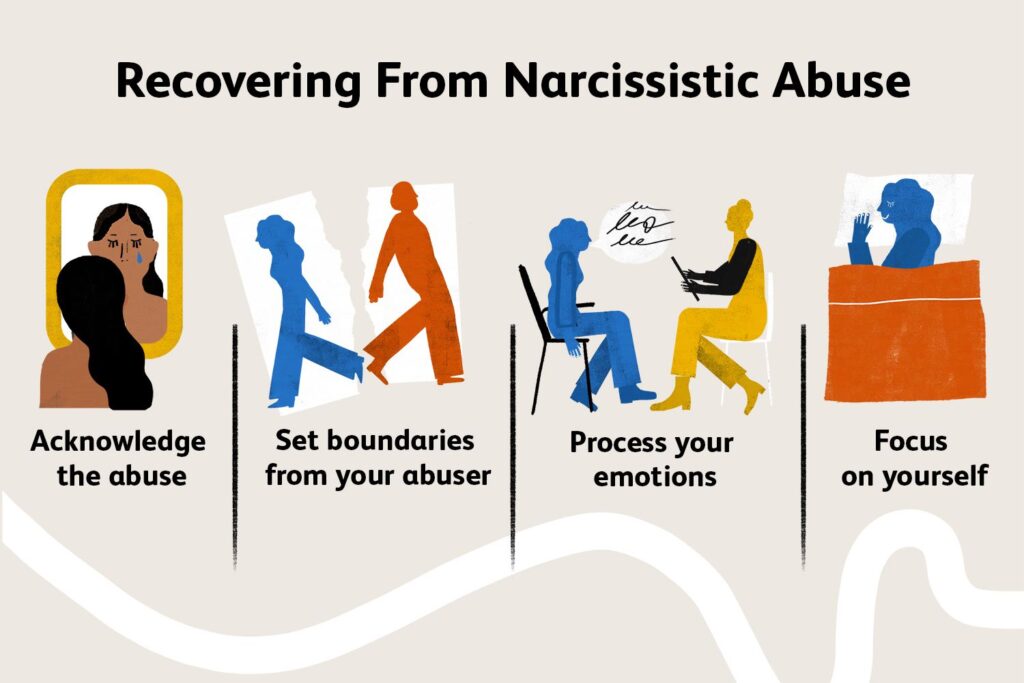Recovering from narcissistic emotional manipulation can feel like climbing out of an invisible prison. You may have walked on eggshells for months or even years, constantly doubting yourself and questioning your own reality. The scars left behind aren’t always visible, but they are deeply felt.

This article is here to guide you through the recovery journey. It will give you clarity, tools, and encouragement. Most importantly, it will remind you that you are not broken—you are healing. Whether you’re wondering how long recovery takes, how to break free from the cycle, or what healing looks like in real life, this guide will walk with you step by step.
Understanding Narcissistic Emotional Manipulation
Narcissistic emotional manipulation is a subtle but devastating form of psychological control. Unlike physical abuse, it often goes unnoticed, but its effects can be just as damaging. Common tactics include:
- Gaslighting: Making you question your memory, perception, and even sanity.
- Love-bombing: Overwhelming you with affection to gain control.
- Silent treatment: Withholding communication to punish or control you.
- Blame-shifting: Refusing accountability and making everything “your fault.”
- Guilt-tripping: Using shame to force compliance.
These behaviors slowly erode confidence, leaving victims feeling powerless, dependent, and emotionally drained. Understanding these patterns is the first step toward reclaiming your freedom.
The Healing Journey: What to Expect
Healing from narcissistic manipulation is not a straight path—it’s a spiral. Some days you’ll feel strong, and other days you’ll feel like you’ve taken ten steps back. That’s normal.
- Ups and downs are part of recovery. Expect waves of grief, anger, and confusion.
- Timeframes vary. No two survivors heal at the same pace.
- You are not alone. Millions of people have walked this path and come out stronger.
Think of healing as building a new life brick by brick. Each small step matters, even when it doesn’t feel like progress.
How Long Does It Take to Recover From Narcissistic Abuse?
One of the most common questions survivors ask is, “When will I finally feel normal again?” The truth is—there’s no universal timeline.
Recovery may take:
- Months if the abuse was short-lived or you have strong support.
- Years if it was long-term, deeply manipulative, or combined with other forms of trauma.
Factors that influence recovery include:
- Duration of the relationship.
- The intensity of manipulation.
- Whether you had supportive friends or family.
- Access to therapy and healing resources.
- Your own resilience and coping style.
While timelines differ, healing is always possible. The moment you start prioritizing yourself, you’re already moving toward recovery.
How to Break a Narcissist Cycle of Manipulation?
Breaking free from a narcissist’s cycle requires both strategy and courage. Here’s how you can start:
- Recognize the pattern. Awareness is your greatest weapon. Once you identify the cycle—love-bombing, devaluing, silent treatment, reconciliation—you can predict and resist it.
- Set firm boundaries. Decide what behaviors you will no longer tolerate and communicate them clearly.
- Go no-contact if possible. Cutting off all communication is often the fastest way to break free. If you must stay in contact (co-parenting, work), use the “grey rock method”—remain neutral, unemotional, and brief.
- Detach emotionally. Stop trying to win their approval; you’ll never get genuine validation from a narcissist.
- Focus on self-trust. The more you listen to your intuition, the less power their manipulation has over you.
Breaking the cycle doesn’t just free you from them—it rebuilds your sense of control over your own life.
How Did I Heal From Narcissistic Abuse?
Healing often begins the moment you realize you deserve better. Survivors use different tools, but many share similar steps:
- Journaling. Writing down feelings helps separate your voice from the manipulator’s.
- Therapy. A safe space to unpack the trauma and rebuild self-worth.
- Mindfulness and meditation. Learning to calm the nervous system after years of stress.
- Community support. Talking with others who’ve experienced narcissistic abuse can be life-changing.
- New hobbies and goals. Reclaiming passions that were suppressed helps restore identity.
Healing doesn’t happen overnight. But over time, survivors rediscover strength they thought was lost forever.
How Long Does It Take to Heal From Emotional Manipulation?
Emotional manipulation leaves invisible scars. Healing from it takes time, but the process is often faster once you recognize what happened.
- Short-term manipulation may take weeks or months to overcome.
- Long-term exposure (such as growing up with a narcissistic parent or staying in a toxic relationship for years) may take longer, often 1–3 years or more.
Healing requires:
- Acknowledging the manipulation.
- Rebuilding trust in your own judgment.
- Practicing emotional boundaries.
- Prioritizing consistent self-care.
Remember: It’s not about how fast you heal—it’s about moving in the right direction.
Practical Steps to Accelerate Recovery
Here are tools you can use right now to support your healing:
- Daily self-care rituals. Sleep, eat balanced meals, and move your body.
- Grounding exercises. Deep breathing, yoga, or simply walking barefoot on grass.
- Affirmations. Remind yourself: “I am enough. I deserve respect. I am healing.”
- Therapy. Consider CBT, EMDR, or trauma-focused approaches.
- Surround yourself with safety. Build a circle of people who genuinely care.
These small, consistent actions create big changes over time.
Rebuilding Your Identity & Self-Worth
Narcissists thrive on breaking down your identity. Recovery is about rebuilding it.
- Reconnect with your values. Ask yourself: What truly matters to me?
- Try new hobbies. Explore interests that bring joy without judgment.
- Challenge limiting beliefs. Replace “I’m not good enough” with “I am worthy of love and respect.”
- Celebrate small wins. Every step forward is proof of progress.
The more you reclaim your identity, the less power the past has over you.
Moving Forward: Thriving Beyond Manipulation
Healing doesn’t mean forgetting the past—it means using it as fuel for growth. Signs you’re moving forward include:
- Feeling calmer and less reactive.
- Trusting your instincts again.
- Choosing healthier relationships.
- Experiencing joy without guilt.
You are not defined by what happened to you. You are defined by how you rise from it.
Conclusion
Recovering from narcissistic emotional manipulation is not easy, but it is possible. You may wonder how long healing will take, how to break free, or how to rebuild yourself—but remember: every day you choose healing, you take your power back.
Be patient with yourself. Healing is not about speed, it’s about transformation. With time, self-care, and resilience, you will not only recover—you will thrive.
You deserve peace, freedom, and a life that is truly yours.



